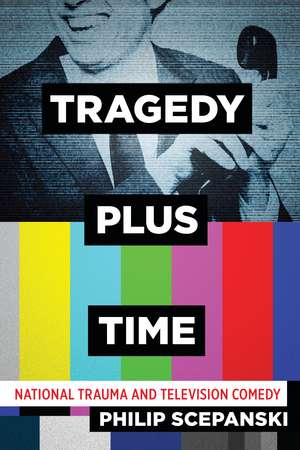Tragedy Plus Time: National Trauma and Television Comedy
Autor Philip Scepanskien Limba Engleză Hardback – 6 apr 2021
Tragedy Plus Time is the first comprehensive work to investigate tragedy-driven comedy in the aftermaths of such traumas as the JFK assassination and 9/11, as well as during the administration of Donald Trump. Focusing on the mass publicization of television comedy, Scepanski considers issues of censorship and memory construction in the ways comedians negotiate emotions, politics, war, race, and Islamophobia. Amid the media frenzy and conflicting expressions of grief following a public tragedy, comedians provoke or risk controversy to grapple publicly with national traumas that all Americans are trying to understand for themselves.
Preț: 435.75 lei
Nou
Puncte Express: 654
Preț estimativ în valută:
83.38€ • 89.16$ • 69.52£
83.38€ • 89.16$ • 69.52£
Carte indisponibilă temporar
Doresc să fiu notificat când acest titlu va fi disponibil:
Se trimite...
Preluare comenzi: 021 569.72.76
Specificații
ISBN-13: 9781477322543
ISBN-10: 147732254X
Pagini: 280
Dimensiuni: 152 x 229 x 25 mm
Greutate: 0.51 kg
Editura: University of Texas Press
Colecția University of Texas Press
ISBN-10: 147732254X
Pagini: 280
Dimensiuni: 152 x 229 x 25 mm
Greutate: 0.51 kg
Editura: University of Texas Press
Colecția University of Texas Press
Notă biografică
Philip Scepanski is an assistant professor of film and television at Marist College. He holds a PhD in media studies from Northwestern University. His work has appeared in the journals Television and New Media and Studies in American Humor, as well as edited collections, including How to Watch Television; The Comedy Studies Reader; Taboo Comedy: Television and Controversial Humor; The Dark Side of Stand-Up; Taking a Stand: Contemporary Stand-Up Comedians as Public Intellectuals; and Exploring the Edges of Trauma: 150 Years of Art and Literature. He has also taught at Vassar College, Northwestern University, and the University of Notre Dame.
Cuprins
Acknowledgments
Introduction: Broadcast Nationalism, National Trauma, and Television Comedy
Chapter 1: The Kennedy Assassination and the Growth of Sick Humor on American Television
Chapter 2: Censored Comedies and Comedies of Censorship
Chapter 3: Emotional Nonconformity in Comedy
Chapter 4: Conspiracy Theories and Comedy
Chapter 5: African American Comedies and the 1992 Los Angeles Riots
Chapter 6: Television Comedy and Islamophobia after 9/11
Chapter 7: Comedy and Trump as Trauma in Narrowcast America
Conclusion
Afterword
Notes
Bibliography
Index
Introduction: Broadcast Nationalism, National Trauma, and Television Comedy
Chapter 1: The Kennedy Assassination and the Growth of Sick Humor on American Television
Chapter 2: Censored Comedies and Comedies of Censorship
Chapter 3: Emotional Nonconformity in Comedy
Chapter 4: Conspiracy Theories and Comedy
Chapter 5: African American Comedies and the 1992 Los Angeles Riots
Chapter 6: Television Comedy and Islamophobia after 9/11
Chapter 7: Comedy and Trump as Trauma in Narrowcast America
Conclusion
Afterword
Notes
Bibliography
Index
Recenzii
Focusing on comedy programs from the 1990s and early 2000s, including Family Guy, South Park, The Simpsons, and In Living Color, the author adeptly explains how these programs not only offer a means of escape for viewers processing national trauma, but also create new narratives that bleed out into national dialogue, with perhaps unintentional but wide-reaching consequences reverberating in the United States today...A must for media and communication studies departments, this work will also appeal to many comedy fans, traumatologists, and the generally curious.
[An] insightful and innovative book...Scepanski is fairly thorough in his writing on both the general topic as well as its neatly-ordered subtopics.
Scepanski effectively demonstrates throughout his book that the perceived status of television comedy as lowbrow entertainment, its ever-narrowing target audience, and its propensity to offend combine to place the TV comedy genre in an opportune position to address sensitive topics...Perhaps more than ever, this sort of historical and contextual perspective on television comedy is urgently needed for the complex mapping of the current American media culture and its ramifications. If comedy is an often quickly overlooked or dismissed genre, Scepanski proves that it should not be, given its significance in shaping Americans’ sense of national identity and history.
Tragedy Plus Time takes a serious look at how comedy and satire in American media make light of dark matters...thorough and engaging...Scepanki’s study is useful to understand the ways that comedy constructs a view of the past, thereby influencing perceptions of historical events. Those lessons do not disappear but become integrated into worldviews going forward, shaping how national trauma plays a role in both national and individual identity.
Tragedy plus Time feels prescient. Reading the book, I got the sense that I was immersed in a discourse that society will be examining for the foreseeable future in trying to understand the relationship between comedy and trauma...Tragedy plus Time advances a noteworthy collection of ideas about how collective trauma is (often unexpectedly) processed through humor...While aimed toward comedy scholars broadly, this book is particularly valuable to those curious about comedy’s intersection with history and politics.
[A] truly excellent new book...Tragedy Plus Time is sophisticated, compelling, timely and well-written. It has a wide appeal for readers of all generations and backgrounds—just like television itself.
Descriere
As the saying goes, “Comedy equals tragedy plus time,” but in the face of tragedies on a national scale, comedy becomes the medium through which audiences untangle accepted understandings of what it means to be American.
